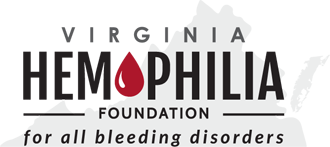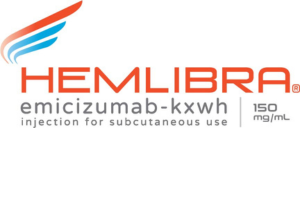Women, Girls, and People who had or have the Potential to Menstruate (WGPPM)* with Bleeding Disorders
At VHF we care about women, girls, and people who had or have the potential to menstruate (WGPPM)* with bleeding disorders. Our mission is to support the needs of WGPPM with bleeding disorders through community, advocacy, and education. If you (or someone you care for) are looking for a bleeding disorders risk self-assessment tool** take the Better You Know survey developed by the National Bleeding Disorders Foundation (NBDF). This survey will help to determine if you (or someone you care for) are maybe at risk for a bleeding disorder. For more information on signs and symptoms download these brochures:
- “Could I Have a Bleeding Disorder?” from the Foundation for Women & Girls with Blood Disorders ( FWGBD)
- “Women and Girls with Hemophilia” from the World Federation of Hemophilia (WFH)*contains information on family planning and pregnancy.
In collaboration with Hemophilia of Georgia (HoG), the FWGBD launched its first online learning module, Clinical Strategies for Managing Heavy Menstrual Bleeding. Access the no-cost Webinar here.
Resources and education for teens and tweens
According to the CDC Bleeding Disorders in Women page, in the US, as many as 1% of WGPPM have a bleeding disorder, and many are unaware of their condition. Some examples of bleeding disorders include inherited platelet disorders, von Willebrand disease and hemophilia. It is important that tweens and teens learn the signs of a bleeding disorder, feel empowered to talk to a trusted adult if they suspect that they might have one, and work with a doctor to find out what is causing their symptoms. Here are some resources to help get you started:
- Hemophilia Federation of America (HFA) – Menstruation Tracking Tools
- NBDF Time to Talk Puberty: A Guide for girls with bleeding disorders
- NBDF Time to Talk Puberty: A Guide for girls with bleeding disorders, Tips for Parents and Caregivers
- NBDF It’s Your Health. Own It. Period: Know how long is too long for your period. Know if it maybe due to a bleeding disorder so you can start to feel better. It’s Better You Know.
- NBDF Victory for Women Resource Page
- NBDF Steps For Living: Girls
In collaboration with Hemophilia of Georgia (HoG), the FWGBD worked with medical providers, to develop the following resources for patients to address heavy menstrual bleeding.
- About Your Period
- Period FAQ | Periodo Preguntas Frecuentes
- Heavy Menstrual Bleeding | Sangrado Menstrual Abundante
- Iron Deficiency Anemia | Anemia por Deficiencia de Hierro
- Menstrual Product Options | Opciones de Productos Menstruales
FWGBD, 7-2-1: All you need to know about periods, a conversation-style podcast that answers the most pressing questions about periods and heavy menstrual bleeding.
FWGBD & HoG – For Girls with Bleeding Disorders: What to Expect During Your First Gynecological Exam | Para niñas con trastornos hemorrágicos (sangrado): ¿Qué esperar durante tu primer examen ginecológico?
What to do if you have signs or symptoms of a bleeding disorder
If you have signs and symptoms of a bleeding disorder, please talk with a health care professional. Bleeding disorders can be dangerous if they are not treated. WPGGM with untreated bleeding disorders face serious risks after childbirth, dental surgery, other surgery, or injury.
Many WPGGM start by seeing one of the health care professionals listed below. Depending on your health insurance coverage, you may need a referral, if you have questions contact your insurance plan for specifics and/or go here to learn more about navigating the healthcare system.
Hematologist A hematologist is a physician who treats diseases and disorders of the blood. Many hematologists who specialize specifically in bleeding disorders work at Hemophilia Treatment Centers (HTCs). To find an HTC that offers specific services for WPGGM with bleeding disorders go here.
HTCs in Virginia with specific programs for WPGGM
Children’s Hospital of the King’s Daughters (CHKD) Menorrhagia Program, Multidisciplinary Clinic of Adolescent Gynecology and Hematology at CHKD. New patients must be under 18, if 18-21 they can be referred for a bleeding disorder work up, but Gynecology doesn’t take new adult patients. For patients with diagnosed bleeding disorders having issues related to menorrhagia and are interested in hormonal management. Patients with thrombophilia /sickle cell/ long term anti-coagulation therapy with heavy periods. Patients with menorrhagia whose PCP or GYN is concerned may have a bleeding disorder. Patients who end up in the ED/admitted for severe iron deficiency anemia related to heavy periods. Clinic Phone Number: 757-668-7243
University of Virginia ABCD clinic (Adolescents with Bleeding and Clotting Disorders) Multidisciplinary Clinic of Adolescent Gynecology and Hematology. For anyone under the age of 18 years old with concern for heavy bleeding and/or anemia resulting from menstrual bleeding (as well as possible other factors). Also, anyone under 18 years of age who desires hormonal therapy but has a history of blood clots or family history of blood clots. Clinic Phone Number: 434-924-8499
OB/GYN (obstetrician/gynecologist) focus on women’s reproductive and sexual health and are a good source of information around symptoms such as heavy periods.
Primary Care Physician/Pediatrician A PCP (primary care physician) provides preventive care and basic diagnoses of common illnesses and medical conditions. For children and teens, the equivalent would be a pediatrician.
Healthcare providers and/or student health services on campus If you are currently enrolled in college/university most campuses have a health center that can assist you in determining options.
Community resources and education
Once you have determined that you may have signs and symptoms of a bleeding disorder, setting up an appointment with a health care provider, getting prepared for your first appointment, and finding community resources can help you feel more comfortable and assist you in receiving the proper diagnosis. Here are some resources to help get you started.
- Believe Limited Documentary: Dismissed Dismissed tells the stories of women with hemophilia who have been ignored, misdiagnosed, or left untreated for generations. At its center is 15-year-old Isabelle, a rare case who received early care and now advocates for others.
- Centers for Disease Control and Prevention (CDC) – Bleeding Disorders in Women
- Foundation for Women and Girls with Blood Disorders (FWGBD)
- Hemophilia Federation of America (HFA) – Blood Sisterhood
- HFA Blood Sisterhood – Resource List
- HFA & FWGBD – A Resource About Women with Bleeding Disorders for You to Share with Your Provider
- Hemophilia of Georgia (HoG) – The Hemophilia, von Willebrand Disease, & Platelet Disorders Handbook
- FWGBD & HoG – Managing Your Bleeding Disorder: Before, During, and After Pregnancy
- Let’s Talk Period – Website that aims to increase awareness of the signs and symptoms of bleeding disorders
- National Heart, Lung, and Blood Institute – Your Guide to von Willebrand Disease
- NBDF Better You Know – How to Prepare
- NBDF Better You Know – Healthcare Diary
- NBDF Better You Know – Your Guide to Lab Tests, Screening Tools and Health Exams
- NBDF Better You Know – Lab Test Log
- NBDF Better You Know – What’s A Normal Period
- NBDF Victory for Women
- National Outreach for von Willebrand (NOW) Conference
- Office on Women’s Health (OASH) – Bleeding Disorders
- Ready.Set.Flow – What’s A Normal Period
Support for Period Products
The VA Bleeding Disorder Program (VBDP) convened a workgroup consisting of VBDP team members, HTC social workers, and chapter representatives to create a statewide resource guide for accessing period care products.
The term “Period Poverty” is defined as inadequate access to menstrual (period) hygiene tools and education, including but not limited to sanitary products, washing facilities and waste management. A 2021 study conducted by U by Kotex® revealed that 40% of respondents struggled to purchase period products and showed an increase from the initial survey conducted in 2018.
As a result of increased awareness of this issue, several community resources have been developed to help address the issue of affordable access to period supplies. The VBDP workgroup has compiled a statewide resource guide with information about resources and support available. To view this new resource, please visit: Virginia Period Resource Guide
Asistencia para elcuidadomenstrual (elperiodo) en Virginia
To learn more about this issue, including advocacy efforts and other ways to help, visit: Alliance for Period Supplies
*VHF is following the lead of the National Bleeding Disorders Foundation (NBDF) who uses the term Women, Girls, and People who have or had the Potential to Menstruate (WGPPM) to be inclusive of the needs and experiences of gender diverse people who were assigned female at birth, and those who now identify as a woman or a girl. While the term WGPPM is framed around menstruation, not all currently menstruate. Regardless of gender identity, some people have had hysterectomies, others have their periods suppressed or ended from hormone therapy, and others have gone through menopause. It is the “potential” that is the unifying element in this term, as some may never have started their periods in the first place. In addition, NBDF acknowledges that bleeding for WGPPM is not just about heavy menstrual bleeding. Addressing other types of bleeding is critical for overall improved health outcomes.
**Please note the risk assessment tools are in no way a substitute for a diagnosis from a qualified medical provider, and the information on this site is provided for your general information only (please see NBDF’s full Medical Disclaimer.)


